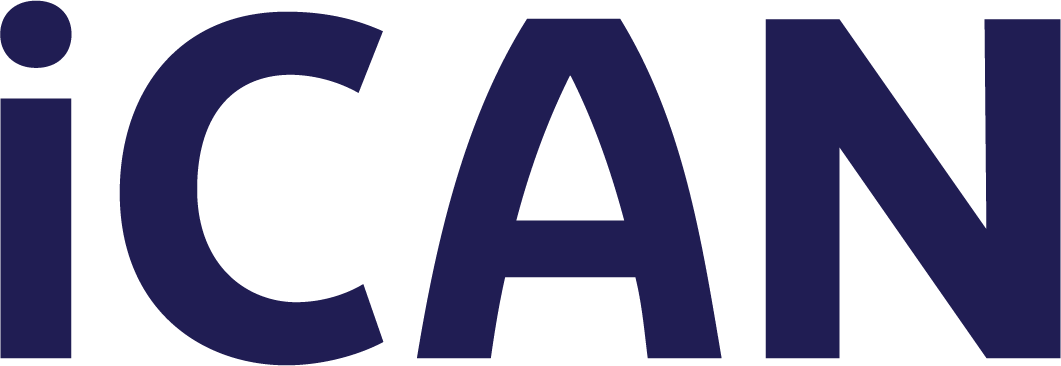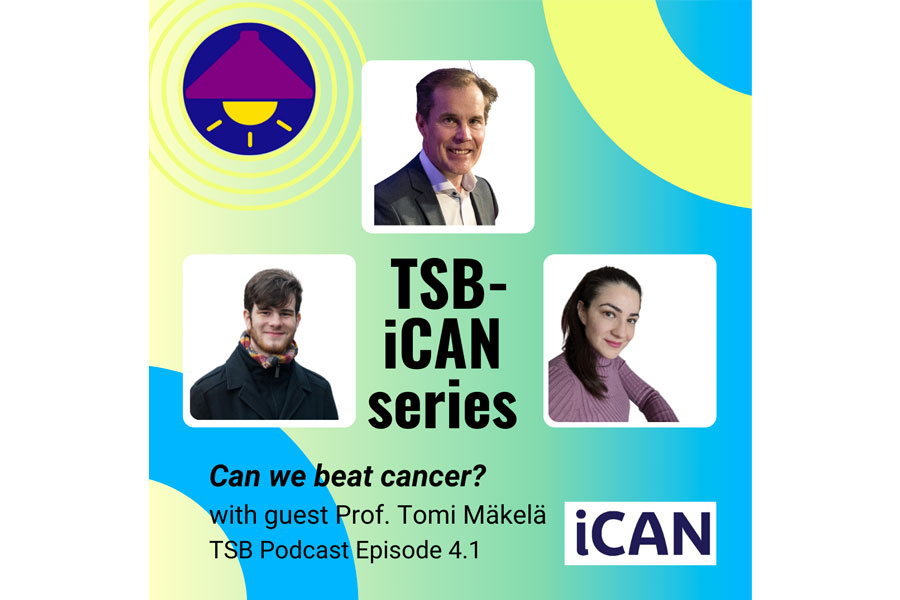What exactly is cancer? Can we beat it?
What do we know about cancer, and what are some of the current cancer research trends? This article highlights key points from the first episode of the iCAN and The Science Basement podcast miniseries.
To honor World Cancer Day on the 4th of February, iCAN and The Science Basement teamed up to create a podcast miniseries about cancer research. In the first episode, The Science Basement hosts Tomás Garnier Artiñano and Eleanna Asvestari interviewed iCAN Executive Officer, Professor Tomi Mäkelä, University of Helsinki and HUS Helsinki University Hospital.
This article is a (long) deep dive into cancer research – listen to the entire episode on SoundCloud, Spotify and iTunes.
The big C: What exactly is cancer?
Tomas Garnier Artiñano: We’ll start today with a basic question. People are aware of cancer and what a terrible disease it is, but what exactly is cancer? What constitutes this disease?
Tomi Mäkelä: First of all, cancer is a disease which has a dreadful stigma in society, so the big C is something that you never want to hear. And this is something that has been very true for a long time. Fortunately, these days it’s becoming a little bit of a smaller C.
If we think about biology and what’s happening in the disease, cancer is different from other diseases we have, because it starts from a single cell whose genome, DNA, gets altered. If you think of our body as a society, the cell becomes a terrorist of society. Once it gains mutations, it’s like a silent terrorist. Then gradually it may acquire further mutations and acquire more characteristics, which makes it get more and more attention, and finally can become a huge problem: it expands like a terrorist cell. That makes this a very different disease from for instance neurogenetics or other diseases.
Eleanna Asvestari: You mentioned before that cancer in the society was like a big no no, you wouldn’t want to name it, you wouldn’t want to have it and it’s like this burden we carry. But why exactly today are we talking on this episode about cancer?
Tomi: Well, for two reasons. One is that from a societal and global perspective, cancer is becoming a bigger disease burden. The population especially in the Western world is aging quickly. This means that more and more people will end up having cancer sometime during their lifetime: if we don’t get new solutions, 60% of people who are born during the next ten years will end up having cancer during their lifetime. This is a dramatic increase from the current situation.
And, from a positive side, we’re talking about it because we’re finding more and more new ideas of how to tackle and try to fight cancer.
How has our understanding of cancer improved?
Tomas: This societal problem is obviously massive, but as you said we’ve done some progress in helping patients and this big C has been becoming smaller. Part of it is because there are newer treatments that have increased the lifespan and the quality of life of patients. What are the things that we’ve learned along the way about this disease? What do we know about cancer that has led us to diminish the burden?
Tomi: Firstly, it’s always very important to stress that the big C is still a big killer. It’s dreadful for lots of patients, and therefore this is not to be underestimated. But where the improvements have been made is our understanding of what’s behind the disease. We’ve been able to go further and further in understanding how it takes place and what is behind a cancer.
With this improved understanding we can devise treatments which are more rational from the cancer point of view, as opposed to being just empirical – something that is just tried out and found to work.
This increased understanding has also led to understanding that whereas cancer is often talked about as a single disease entity, it’s in fact not even a thousand diseases, but more like a million diseases. It’s almost like each cancer is its own disease because it’s a combination of mutations that are taking place in the cells.
Because there are lots of different mutations, combinations are high, so we need to look at each cancer as a unique cancer. This is what is called precision cancer medicine, and itis gaining a lot of potential. It allows us to – in the best-case scenario – find a drug which can work for a single patient with for instance breast cancer, whereas it would not work for another person with breast cancer.
Millions of diseases: what do cancers have in common?
Eleanna: You mentioned that these are millions of diseases. They are rogue cells that divide, but is there anything else that holds them together so that we call them all cancer? What do all these diseases have in in common from a cellular perspective?
Tomi: First of all, cancer is always a disease of the genes. It’s a genetic disease, this has to be the case because the cancer has to grow. It means that the cells must duplicate and give this cancer characteristics to the to the daughter cells. So, it must be in the hard drive – in our genome – and so this is what this is the central dogma.
The second central dogma for a cancer, that is bad for a patient, is that the cancer grows and finally spreads. And this is something that is not always the case. In fact, there are a lot of cancers which are never noticed, because a cancer cell is born but it never spreads, and it never causes the disease. In this way, it is not a shared feature of all cancers, but it is a shared feature of those cancers which become a problem. So, to put it very simplistically, multiplying and spreading are common to cancer cells.
Same, same but different
Eleanna: There are also the genetic syndromes which are changes in the genome that happen when the embryo is developed, but cancer is changes in the genome that happens during the life after birth, right?
Tomi: Yes, that is correct. When I say that cancer is a genetic disease, that means that it’s a disease of genes in a single cell. Whereas our genome, which is what we have inherited from our parents and grandparents, is something that is taking place in all our cells.In the genome that we inherit, there can be genes or variants of genes which are predisposing to many diseases, including cancer.
However, these are just increasing the likelihood of something happening, but cancer is always something that happens during our lifetime. These are called somatic mutations, which means mutations during the lifetime.
Eleanna: It’s not only that we have cancer in different organs, but also the same type of cancer will be different among individuals and that’s an added complexity. And that is why it takes so long to gain knowledge about cancer.
Tomi: That’s exactly right. In fact, a lot of people who try to understand the mechanisms of cancer consider each cancer as an individual disease which is different from the others. We now have the technological capability to look at all the mutations in the three billion nucleotides of a cancer cell. Usually there are hundreds or thousands of mutations, and therefore the combination of having the exact same mutations in two different cancers is almost impossible. It’s less likely than winning the lottery.
A limited number of pathways leading to cancer
Tomás: How can we learn about these different cancer diseases and at the same time draw any meaningful conclusions with all this plethora – what is there to learn and how do we do that?
Tomi: When I’m emphasizing the point that every cancer is different, it means that there’s a limited number of pathways in which cells are behaving that can go wrong and that can lead to cancer. And these pathways they’re still numerous enough so if you look at all the combinations that take place and look at the different combinations that are possible, it adds up to a very high number.
It’s like the lottery. In the Finnish lottery you have 40 numbers you can guess on, and you have to guess the six right numbers. It’s very infrequent that that you get the same six numbers. With cancer it’s basically the same game. And because of that, we need to understand all 40 numbers – we must understand how all these different pathways are working. If we do, we can then analyze which are the “numbers” for each cancer, and then we can optimally identify one, two or even three pathways which we can target with a drug, and thereby perhaps help the patient with that with that particular cancer.
It’s complicated
Tomás: What are the research trends in this? If you have so many data points that you can draw on and so many pathways that the disease can take, how do you research all of this information to understand the disease better and hopefully be able to help patients one day?
Tomi: If we continue with this lottery comparison, we’re getting to the point where we have a pretty good idea of how many lottery numbers there are – or how many different pathways, how many different genes can be mutated or can be relevant for cancer. The picture is still becoming more and more clear, but we have a general idea of what that is, so that’s kind of a done deal – check. And now the question is, how do all these work together?
Because there are so many combinations, this of course becomes a complicated problem. So, if you have numbers 1, 2, 7, 8 and 11, how does that cancer behave compared to one where there’s a different set of five numbers? The trend is currently to utilize the fantastic technological advances we have in data sciences so both the ability to collect data and to analyze it. This is of course changing all fields of science, but also cancer research.
And the second part is technological advances in being able to look at what’s happening in cancers, not only in artificial systems, such as looking at still images of cancers in a pathology view or using model systems.
Now it’s more about trying to go as close as possible to the real cancer in human beings. One example of this is what are mini cancers or organoids. We can sometimes take a cancer from a patient and actually grow that cancer and even its surrounding tissues outside of the body in a small limited environment. We can keep it growing and analyze exactly how that cancer is behaving and is it for example reacting to certain drugs.
Where the big discoveries will take place
Tomás: What is iCAN and can you tell us what its research focuses in regard to cancer and what distinguishes it from other cancer research organizations?
Tomi: iCAN is an eight-year pan-cancer research project which is enabled by the Finnish government. We started in 2019 and it is a very ambitious, large-scale project. The idea is to collect data both from the cancer tumors, as well as from the patient, and try to improve understanding of how the interaction between the tumor and the patient is happening.
This is an area where it’s very clear that the big steps ahead in cancer research will be coming. A very good example of this is immunotherapies which have been developed during the last ten years and have really made a difference in cancer therapy.
Waking up the immune system
Eleanna: In immunotherapies, you really target the specific case of the patient. So, the patient comes with a specific cancer and then their treatment is going to be different from the treatment another person will receive, right?
Tomi: There are two different kinds of kind of precision treatments. One is that a patient’s cancer is identified to have a specific gene mutation that is known to respond to a drug that we already have. This is called targeted treatment.
Then there’s a group of patients whose cancers behave in a way where they take a stealth mode – if you know this term from the fighter jets – they hide from the immune system that we have which is protecting us against all aliens. And this stealth mode allows the cancer to become a non-alien for the immune system and the immune system ignores them.
Immunotherapy is opening up the stealth mode. It’s an attractive way of treating cancers and currently a lot of the drugs which are being developed are utilizing this cancer host or patient interaction.
Eleanna: So essentially, you’re trying to awaken or make the immune system of the patient stand up to the cancer cell or uncover them from how they’re hiding.
Tomi: There are a couple of different ways. The current immunotherapies which are in broad use are mostly trying to break the stealth mode. They are taking something away from the cancer cell that is enabling them to hide.
There are also new approaches which are trying to for instance activate the immune system. Most of them are called checkpoint therapies. It means that the cancer cell currently knows how to avoid the immune system’s checkpoint. The drug brings back the checkpoint and attacks the cancer cells which it recognizes as a foreign cell.
How things work, and how they don’t
Tomás: It’s amazing to see how complex the body is. What brought you to cancer research – what is it that you find interesting about cancer as a disease and as a research topic?
Tomi: The reason I’m in this area is because I’ve always wanted to figure out how things work. It’s as simple as that. And when you want to know how things work, you look at things which don’t work, because that’s a good way to understand how things work. The reason I then ended up in the cancer area is maybe more coincidence than anything else, but of course now having been here for a long while, it’s very rewarding to see how developments are happening. For the last few years, it’s been very rewarding to be able to interact with patient organizations who are very active in trying to develop new solutions.
A zero deaths goal – can we beat cancer?
Tomás: To go back to the beginning and the title of this episode. You’ve seen the area change throughout the years, and of course you are a specialist in cancer – do you think we can beat cancer?
Tomi: I like to take a comparison from a completely different field, cars. When Volvo patented the three-point seat belt in in 1959, and thereafter Sweden as a country decided on a zero deaths goal for traffic. Everybody understands that the seat belt has made a huge change and saved a lot of lives. At the same time, having a zero deaths goal is probably not possible.
I think the same holds true for cancer. At the end of the day, we are biological creatures and the result of millions of years of evolution and from an evolutionary point of view we are useful for the time when we are reproducing or helping reproduction. We are currently focusing most of our attention in – not only cancer research but in neuroscience and elsewhere – trying to prolong lives which are already from a biological perspective way too long.
Therefore, I don’t think that we are going to beat cancer completely. The longer we live, the more we will have of these old age problems. At the same time, it’s fantastic that huge improvements have been made. More and more people will be able to live with cancer, that’s already taking place. Something that’s very important is to remove the stigma of cancer. It’s part of life, and I think it’s very important that we continue to think of ways to find new solutions and thereby get closer to the zero target.
Eleanna: This is a very important message. It’s not only with cancer, but as you said with many other things in life, you can’t hit zero, but at least you can go as close as possible to it and improve the situation. To achieve this, we need research and to do research especially in life sciences, we need material and that comes from the people themselves. It’s important to contribute as patients to science and as society to help as much as possible the scientists who keep on doing the work to save lives. That will be my message for people to take home from today’s episode. But I’m curious to hear, what is yours?
Tomi: If we think about cancer, a problem that will be increasing hugely unless we make new solutions. I think we all want our kids and our future generations to have a good life. That means we need to find new solutions. The only way to do that is by improving understanding in this area of science as well as others, and therefore I couldn’t agree with you more.
Tomás: Thanks a lot for your words and all your knowledge. It’s always nice to hear from someone that knows their topic and is passionate about it, so thanks a lot for sharing that with us.
Listen to the podcast on SoundCloud, Spotify and iTunes to hear the entire discussion – more on big data, ethics, and precision medicine. And stay tuned – in the upcoming episodes, we will continue discussions about fascinating topics in cancer research.


